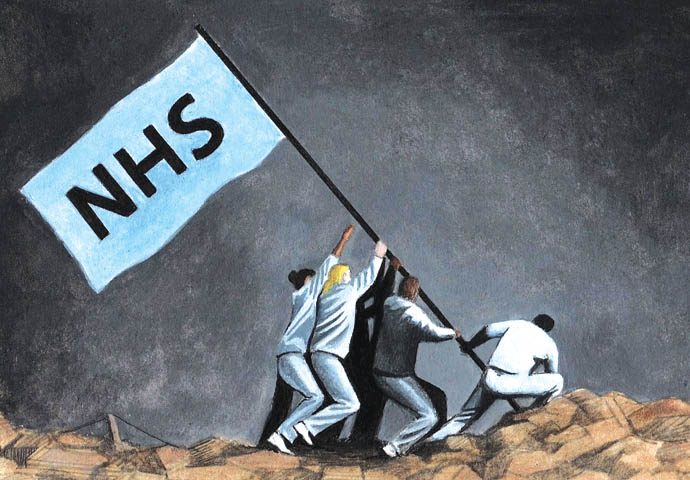My hope for the future after 10 days in a Covid-19 ward
Thursday, 11th February 2021

Illustration by John Sadler www.johnsadlerillustration.com
• HAVING a light breakfast in my bed in a Covid-19 high-dependency respiratory ward in University College London Hospital, I found myself reading every side of a cornflake packet.
Its multiple languages struck me as a metaphor for the hospital staff, medical and others.
Isolating at home with some sort of lurgy, I was in no pain but, one night, that changed markedly.
I completed an NHS form online in the small hours and, within half an hour, a doctor phoned me. In the next hour or so two London Ambulance guys took me to A&E.
In my seven decades on the planet, I have not really been ill and have little experience of the NHS.
I’d tested positive for the virus and spent the next 10 days in various recovery wards, hating every moment of an oxygen mask clamped to my head but able to observe the NHS at work.
In various wards I met NHS staff from our islands, all sorts of Britons, some new here or long-settled from places overseas, and many others, nurses and doctors, immigrants from countries far and wide.
One nurse from the Philippines had been here only six weeks, others from West Africa, Cyprus and the US, another a doctor from Russia.
The teamwork was clear to see. Pleasant, often cheerful, unfailingly courteous, calm and caring and, my gosh, hard-working in their restrictive PPE, seeing the NHS at work was a privilege.
The calmness and bedside manner of consultants and ward staff alike was magnificent. How lucky I was to be in the care of our wonderful NHS – UCH certainly had got its act together. Even the hospital food was pretty good.
The staff I saw were, together, like one of those National Geographic poster maps showing the faces of the people of the world.
It struck me how plain daft, and wrong, of course, it is for anyone to mistreat any of these caring people, particularly on racial grounds and so on (I witnessed no such thing myself).
If only we could learn to treat everyone in our islands with the same decency and respect.
Perhaps an outcome of the pandemic to hope for might be not only to look after the precious NHS but to treat all those we meet, as we go about our lives, as if they were NHS staff. About one in 48 is indeed employed by the National Health Service.
LESTER MAY, NW1